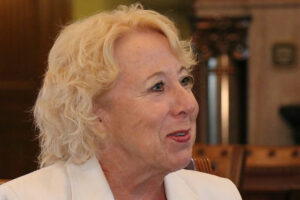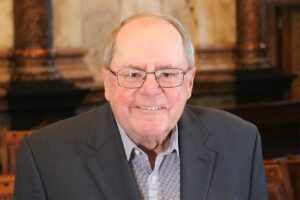Search Results

Interview of Marge Petty, September 11, 2020
Interviewed by Patty Clark
This oral history interview of former Senator Marge Petty covers her 12 sessions in the State Senate representing a Topeka district (Senate 18). Petty talks about why she registered as a Democrat, challenged a sitting Republican woman Senator in the 1988 election, and won. She discusses specific issues such as the investigation of the KPERS venture capital investments with other Senators, healthcare issues, foster care, and education. The interview also chronicles her career after leaving the legislature in 2000. Petty talks candidly about losing that last election, after which she began working for the Kansas Corporation Show MoreCommission. Later, she decided to move back to Dallas and worked to secure an appointment from President Obama as a regional representative of Health and Human Services. Petty describes the process of going after that appointment. This is a wide-ranging interview that shows the energy and skills Petty brought to the public arena. Show Less

Interview of Christine Downey, August 2, 2019
Interviewed by Dale Goter
Former State Senator Christine Downey recalls her three terms in the Kansas Senate (1993-2004) during her 2019 oral history interview. With her background as a teacher, education issues were important to her as the era of school-funding litigation continued. She was involved in water-related policy making, in particular at the nexus of water quality and agricultural practices. She recalls her service in the Senate and on the Kansas Board of Regents first developing the policy and then implementing fundamental changes to the postsecondary education system. Ms. Downey discusses numerous instances of working across the aisle Show Moreto accomplish policy objectives that did not break on strict party lines. Show Less

Interview of Barbara Sabol, January 14, 2022
Interviewed by Joan Wagnon
The former Secretary of Aging and Health and Environment under Governor John Carlin describes herself first and foremost as a nurse. That nursing background propelled her into high level positions in the local, state and federal government, always asking how her actions affected the children and the people she served. She started out in leadership positions in Kansas government and academia before being appointed Secretary of Aging by Governor John Carlin. She worked with advocates to establish the Silver-haired Legislature. She worked for Mayor Marion Barry in Washington DC in his office of Policy and Show MorePlanning in the Department of Human Services. Carlin asked her to return to Kansas as Secretary of Health and Environment where she quickly established a reputation as a problem solver for tough issues such as the permanent closure of a waste dump in Furley that leaked toxic chemicals. Sabol talks candidly about the challenges she faced as an African American and a woman and how she met those challenges. The interview concludes with her describing her latest project, housing for young adults who have aged out of the foster care system. Show Less

Interview of Anthony Hensley, September 16, 2022
Interviewed by Alan Conroy
Senate Minority Leader Anthony Hensley was first elected to the Kansas House of Representatives in 1976 at the age of 22. He moved to the Senate in 1992, finishing an unexpired term of Senator Nancy Parrish. His interview covers his 44 years in the House and Senate, and almost every issue the legislature dealt with in those years: taxes, reapportionment, school finance and labor issues, to name a few. His story about negotiating with Dick Bond to increase funding for schools is a "must read". Hensley's description of how the Brownback tax cuts were Show Moreenacted after the Senate reconsidered its vote to kill them is a lesson in how parliamentary maneuvering between House and Senate can have unexpected consequences. There are many stories about other leaders and other issues to illustrate how the legislature makes laws.
Highlights -- short excerpts from the interview
